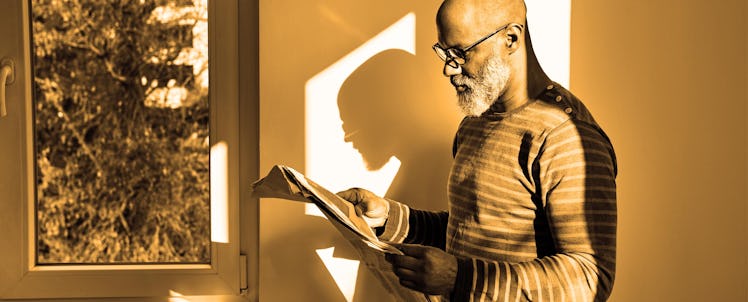I Moved to Australia and Found Work-Life Balance
The culture gave me permission to be inaccessible, and my relationships — with my family, coworkers, and myself — were transformed.

Over the past decade, technology has excelled at consuming our time and mental energy during previously free or quiet moments. You likely recognize the pattern: morning alarm rings, elevator door closes, or kids finally go to sleep, and we instinctively reach for our phones.
I’m most susceptible in a moving vehicle. Put me on a train, bus, or car, and I’m a captive and willing audience for e-mails and social media as soon as I start toward my destination. Not surprisingly, something felt a little off for me when last month I boarded a tram in Melbourne, Australia, only to realize I didn’t have cellular service or wifi. I had only recently arrived in the city — part of an extended work trip with my wife and kids — but I was set on correcting the situation quickly.
I don’t consider myself particularly beholden to technology. I’ve turned off almost all notifications on my phone and laptop, and I’m generally good about staying away from screens before bedtime. Now that I have two young boys, I’m also vigilant about minimizing my phone use when we’re together. After all, I’ve seen the same guilt-inducing research as you: e-mail is hurting our productivity. Phones are interfering with our precarious sleep schedules. Social media is actually making us less social.
This story was submitted by a Fatherly reader. Opinions expressed in the story do not reflect the opinions of Fatherly as a publication. The fact that we’re printing the story does, however, reflect a belief that it is an interesting and worthwhile read.
Even so, my role in the knowledge economy requires that I actively participate in these technologies on most days. I’m a Certified Financial Planner who works — virtually, no less — with young families; video chats, e-mail newsletters, and Slack messages comprise much of my interaction with current and potential clients. I pride myself on being more accessible than financial advisors traditionally have, which means that going off the grid only works in carefully scheduled doses. Travel doesn’t help, since I tend to check maps and dining options on my phone more often than I do at home.
After a few days offline in Melbourne, the connectivity challenge that I initially identified began to appear more like an opportunity. I would need some internet access during our stay, but perhaps forced limitations could reshape habits I formed years ago. Culturally, Australia fosters socializing a bit better than the U.S.: coffee shops here typically don’t offer wifi, lunch with colleagues is standard practice, and work expectations don’t often involve evenings or weekends. In this context, I embraced replacing time spent on e-mail, social media, and impromptu Google searches with a focus on longer-term goals and more in-person interaction, both of which have a bigger impact on the lives of my family and clients.
This use of time can be less visible and frequent than an Instagram post, which makes me occasionally question if it counts for as much. Meaningful activities may take longer to materialize, but I’ve already achieved at least one thing: a not-insignificant sense of relief. The most liberating feeling occurred when I realized I no longer needed to view my day through the filter of a future social media post. I could take a photo to capture a family memory, but the image didn’t need to appeal to (or compete with) anyone else. In fact, I was free to put my phone away entirely and just enjoy the experience with my family.
My mind also stopped reflexively turning to e-mail as a “productive” use of time in those moments when I wasn’t directly engaged in a task or activity. I had resolved to check e-mail only once each day, and I deleted the Gmail app on my phone to assist in the goal. Initially, when I was grabbing a snack or procrastinating before a workout, I did indeed reach to see what my inbox wanted from me. I was always pleasantly surprised to find that my inbox wasn’t accessible, and my mind soon felt comfortable just taking a break.
Research suggests that people are most likely to change transportation habits — from, say, car to train — immediately after a big life event, such as a move to a new house or job. A similar concept may apply to our technology habits. But we enjoy the dopamine hit from our phones so much that we always make an effort to maintain our typical level of connectivity, no matter the circumstances. The idea here is not that we all should travel to a different country to learn to check our phones less impulsively. Rather, if we can just acknowledge brief moments when we’re inaccessible, we empower ourselves to extend and benefit from those moments.
On any given day, most young parents and rising professionals struggle to get even a fleeting mental break. E-mail and social media capitalize on this reality, and appear to be easy, cathartic outlets for our fatigue, stress, or loneliness. As always, we’ll continue to have those times — in elevators, on trains, after our kids go (or don’t go) to sleep — when we get to decide where to direct our attention. What else is possible for us if we return to the days of actually exercising that choice?
Kevin Mahoney, CFP, is the father of two boys and the founder and CEO of Illumint, a financial planning company for young families. He recently moved from Washington, D.C. to Australia, where he’s trying to convince his 4-year-old that he doesn’t need to worry about falling off the map.